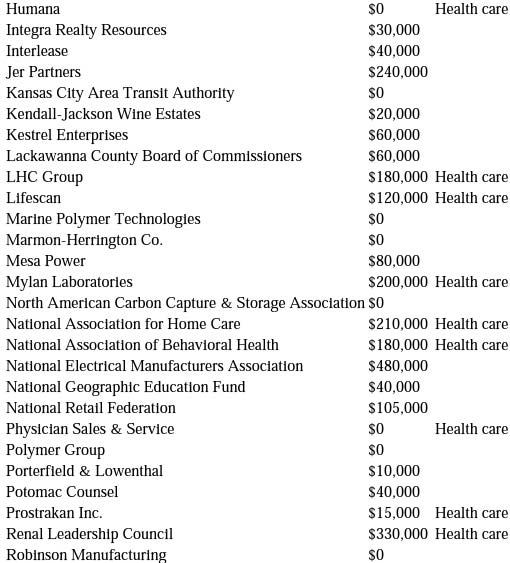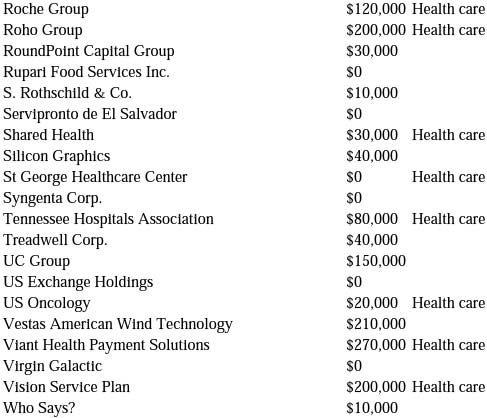Catastrophe (27 page)
Authors: Dick Morris

If Daschle isn’t a lobbyist, why would Alston & Bird promote his position in the firm’s “legislative practice” so aggressively?
And Alston & Bird is involved in high-stakes legislation. To get a sense of the kind of legislative activity the firm engages in, look at some of the health care “successes” it describes on its site:
Representing clients with public policy concerns demands firsthand knowledge of the policy-making process and those in the position of making policy decisions. Alston & Bird has a proven track record of achieving policy success, as well as protecting the interest of clients. The following are a few recent examples of ways in which we delivered successfully for our clients:
- Secured authority for vaccine administration reimbursement for a Medicare Part D vaccine
- Protected numerous at-risk clients from billions of dollars in proposed payment reductions in recent Medicare legislation
- Developed strategy for a privately held company with annual revenues upward of $2 billion that sought new indications for approved medical imaging contrast agents and explored regulatory pathways for combination drug-device products that would deliver contrast agents
- Secured increased payment of more than $400 million for certain clients that provide Medicare services to beneficiaries with chronic health conditions
- Garnered positive legislative changes for two out of only three health care providers in a bill that extracted $50 billion in payment decreases to other health care providers
349
These “successes” were no minor achievements. They involved highly complicated issues that required not just “policy advice” but knowledge, skill, and—most of all—connections. But wouldn’t any such assignment create a conflict of interest for Daschle?
Did the Obama people ignore this glaring potential conflict of interest,
or did they just not get it? It’s hard to imagine that they failed to understand the problem.
To get a sense of just how pervasive the health care business is at the firm, here’s a breakdown of the lobbying fees paid to Alston & Bird in 2008:
ALSTON & BIRD
2008 Total Lobbying Income: $8,080,000 Health Care Interests: $4,735,000




Source:
Center for Responsive Politics and lobbying disclosure documents.
Daschle’s nomination was quickly withdrawn—but not because of his stealth-lobbying experience. Rather, it was because of his failure to declare $182,000 in income. But his financial disclosure form does provide an interesting window into the lucrative world of stealth lobbyists. For a complete view of his disclosure, see http://pfds.opensecrets.org/N00004583_2008_Nom.pdf.
According to Daschle’s January 2009 report, during the previous two years he received $2.1 million in wages from Alston & Bird—
for part-time work!
And he sure must have delivered, because during the same time period he was also paid $2,108,760 by InterMedia, a private equity firm that supplied the $182,000 car and driver that caused his tax problems. It’s not clear what he did for InterMedia, but it certainly paid well.
But that’s not all. Daschle was a very busy man. In addition to the $4.2 million he collected in wages, bonuses, and consultant fees, during this period he made another $491,775 in director’s fees for firms such as the Freedom Forum, BP, and others. And he took in another $390,000 for speech making.
This was quite a change for Tom Daschle. In 2004, as majority leader, Daschle made around $165,000 a year. It sure pays to have “congressional leader” on your résumé!
Daschle still contends he’s not a lobbyist. But are we really supposed
to believe that high-paying special interests paid millions to Daschle and Alston & Bird for civics lessons on the legislative process?
That seems doubtful. What such clients want—and what Alston & Bird explicitly offers—is access to power and decision makers. If what Daschle has been doing isn’t considered lobbying, it should be.
It’s time for the stealth lobbyists to stand up and be counted.
GEORGE MITCHELL, FRIEND OF DUBAI
The world of stealth lobbying has also been a professional home for another former Senate majority leader: George Mitchell. The man who’s become Barack Obama’s special envoy to the Middle East was, until recently, the global chairman of the law and lobbying firm DLA Piper.
DLA Piper is a megafirm with 1,500 lawyers in twenty offices, including Dubai. That particular office is significant because the sheikh of Dubai retained DLA Piper to help it get rid of an embarrassing lawsuit filed against Sheikh Mohammed Bin Rashid Al Maktoum, the leader of Dubai. It was a big deal for DLA Piper. After the firm collected more than $9.5 million in fees for legal work, lobbying, and damage control on the case, the suit was finally dismissed. (For a full discussion of this tawdry case, see our previous book,
Fleeced
, pp. 159–162.)
The lawsuit was brought in Miami on behalf of parents of young boys who alleged that the government of Dubai had regularly and systematically kidnapped small boys—starting at age three—from Bangladesh and Pakistan and forced them into virtual slavery as camel jockeys (only boys of very low weight and size can race on the camels). The suit alleged that the boys were kept in squalid quarters, never sent to school or given medical care, and not even toilet-trained; they were abandoned when they were too heavy to ride the camels.
After the United Nations began to report on trafficking in children in Dubai and the United Arab Emirates and the press began to cover the story about the kidnappings, enslavement, and horrid living conditions of the young camel jockeys, the sheikh suddenly started to be concerned about the poor little boys. It was time for reforms. Suddenly robots replaced the young boys as camel jockeys and institutional housing was es
tablished for the former camel jockeys. Schooling and medical care were provided.
Once the suit was filed, DLA Piper went into high gear for the sheikh. The firm’s filings with the Justice Department’s Office of Foreign Agent Registration list hundreds of calls and visits made to the State Department, the National Security Council, Secretary of State Condoleezza Rice, and Senator Hillary Clinton (whose husband was a business partner of the sheikh at the time), to try to get the U.S. government to intervene in the lawsuit. The lobbying was successful; the suit was eventually dismissed after the government notified the judge of its intention to intervene.
It pays to have friends in high places.
But is Mitchell another Obama appointment that ignores the enormous potential conflict of interest that exist because of the clients at his last job—at DLA Piper?
Once again, Obama seems oblivious to the implications of such an appointment.
As for Mitchell, he claims he had no involvement in the camel jockey matter and that he was not a lobbyist for Dubai. He’s also claimed he never discussed the case with the sheikh when he visited Dubai. Still, on one visit to Dubai he gratuitously defended the United Arab Emirates’” efforts to rescue the camel jockeys.”
350
Was he just personally interested in this issue or was it part of the service delivered for a client? And how likely is it that the chairman of the sheikh’s American law firm would not have discussed a case that was so important to the sheikh that he paid almost $10 million in legal and lobbying fees to the firm to get it to pull out all the stops to fix the problem for him?
Two months after he left the firm to take his appointment as Middle East envoy, DLA Piper’s own Web site still hyped Mitchell’s—as well as former secretary of defense William Cohen’s and former house majority leader Dick Armey’s—Middle East bona fides:
Iraq Reconstruction
DLA Piper US and The Cohen Group have formed a joint Iraq Task Force to respond to increasing client interest in Iraq’s reconstruction by
advising
them on opportunities and risks associated with doing business in Iraq and the Middle East generally. Both firms have significant experience in the region, as well as in other areas undergoing transition, such as Afghanistan and Kosovo, and are already actively advising clients on matters relating to Iraq.
[emphasis added]
Senator George Mitchell
enjoyed an illustrious 15-year career in the US Senate, including six years as the Senate majority leader, and has since earned an unsurpassed reputation in the field of international diplomacy as an individual with an extraordinary ability to help resolve difficult international disputes. He is widely respected by US political figures in both parties and is known and trusted by many of the world’s diplomatic and political leaders.
Congressman Dick Armey
was recognized during his 18 years in national political office for his fairness and his ability to build consensus among parties with conflicting objectives…
Secretary William Cohen
has had a long and distinguished career in Washington, including eight years as a Republican congressman and 18 years as a Republican senator, before being chosen by President Bill Clinton to lead the Department of Defense. As secretary of defense from 1997–2001, Secretary Cohen oversaw US military operations on every continent and held substantive meetings with foreign leaders in over 60 countries.
351
Long after Mitchell left DLA Piper for the State Department, the firm’s Web site still refers to him as “Chairman Emeritus.” It’s clear that Mitchell is still a big deal at the firm—that even his name alone carries a lot of weight.
The firm also has other clients that may cause Mitchell problems. According to Bloomberg News, DLA Piper was paid another $2.29 in lobbying fees by clients focused on or headquartered in the Middle East, including two interested in “human rights” in Iran.
352
In the past, the firm was hired by the Embassy of Turkey. In December 2008, the firm registered as a foreign agent for the United Arab Emirates.
353
Based on public disclosures, DLA Piper also represented First Kuwait General Trading and Contracting for a $240,000 fee. The Lebanon Renaissance Institute paid a whopping $530,000 fee for lobbying services on “matters re: U.S. and Lebanon relations.” (The
nonlobbyist George Mitchell is the son of Mary Saad, who emigrated to the United States from Lebanon when she was eighteen years old.)
